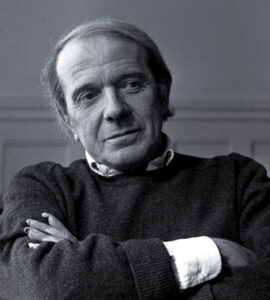Time Flies Over the Cuckoo’s Nest
À Bruno
Certes pas deleuzeuze (deleuziste? Un zeste)
Tout le temps hors de second
[pluriel(s) espacé(s)]
0.
Two theses: Time-driving desire is productive, not representational; Desire-driven world as a non-totalizing horizon explains something like psyche (and humanity), not vice-versa.
One double task: In an age in which the post-human, after long looming, is appearing, philosophy and ‘human’ sciences need each other in order to step toward temporal errantry in its post-human configuration; and to get able to have fruitful exchanges with arts.
Several goals: to gain insight into how the pathologies of dead time – accurately described but poorly understood by psychiatry – can be traced back to the seizure of its errantry by the capital; into how its counter-seizure by the expropriated can take place in an age when fighters have to rally without any unifying identity (but that of underemployed); into how the productive erring of time can escape the numerous traps into the servitude volontaire set along the way of the so often rewritten psychic Formation Novel. The junction between philosophy, post-human sciences and arts is intended to write another time.
1.
As psyche stems from the very core of traditional western metaphysics, philosophy is now called to rework profoundly its own notions while interacting with human sciences, on the edge of the post-human; which can but be post-psychic. Psyche has nowadays got a technical implementation in the production cycle to which not only experimental psychology, cognitive sciences, AI, but also so many therapies, together with psychology-driven cultural industry, are bound to contribute. The challenge, then, is to think and re-frame the errancies of time, even those that seem so suitable to be incorporated into a psyche, without having recourse to the latter to explain them, the direction of explanation having instead to be reversed. However unpleasant rephrasing Margaret Thatcher may sound, there is no such thing as psyche – minus psychology bringing about one, no one will undergo it.
Such a strain of thought stems from the Anti-Oedipus which shakes, at once, both the metaphysical architecture (psychology, cosmology, theology) and the entire apparatus that makes it come true, at each stage of the Western history. In front of an entire world striving to put in place psychic subjects, the key move is to conceive of minds as broken though by the world (a «chaosmotic» world). Of course many time errancies are indeed endured as pathologies by those on or around the cuckoo’s nest; however, flying over it requires one to recognize in them the urge of a psyche-free desire. Such a perspective reversal is itself two-sided: it prompts a turn opening onto the post-human but also draws on the unsubmission of those whose lives are expropriated by timely subjectors and wisely advised about by ‘psychefiers’.
2.
 This seems to be well-timed in a moment when so many indignados people are fighting against the expropriation of their lives. This expropriation is by no means unprecedented: more than one time capitalism had to destroy entire life-worlds in order to get a row human matter to work on and to put at work. Nowadays the disqualification of work, while destroying identities, does also provide a wretched one – rather ‘in dust’ than «liquid» – as an underemployed; which has far-reaching consequences on the way time is lived (which psychiatry does describe but scarcely insight into). Errancy is constantly under the threat of being seized by the capital.
This seems to be well-timed in a moment when so many indignados people are fighting against the expropriation of their lives. This expropriation is by no means unprecedented: more than one time capitalism had to destroy entire life-worlds in order to get a row human matter to work on and to put at work. Nowadays the disqualification of work, while destroying identities, does also provide a wretched one – rather ‘in dust’ than «liquid» – as an underemployed; which has far-reaching consequences on the way time is lived (which psychiatry does describe but scarcely insight into). Errancy is constantly under the threat of being seized by the capital.
Underemployed, however, are reacting; are they attempting to counter-seize their lives for an uncrookedly erring time? Here some questions arise:
- a) How time is in play in the fight over identities? How compulsions, depressions, anxieties are being induced by time expropriation? What can we learn from them in view of how that expropriation can be countered? Both Melville’s Bartleby and Kafka’s K. provide some clues.
- b) How to fight in an age when there is no unifying identity between all the members gathering together in the fight? Nor any precise identity is defined for each of them, let alone between them. At the very least: no identity – if any – is playing a role in making up and preserving their rally. So: What is it like to be a member of one, today? How can it succeed?
- c) Why does subjugation tend to occur again and again – up to the servitude volontaire? And: how can time turn unfit to be seized and taken advantage of by the capital? Here Deleuze and Guattari provide explanations of that subjugation of subjects that Michel Foucault carefully describes, namely the mechanisms of subjection, on the one hand, and the resistance opposing them on the other. Deleuze and Guattari’s bold explanations are worth to be further developed; and forwarded to the fighters of today. Far beyond all Judith Butler styled analyses of the ‘Psychic Life of Power’ that hinge, à la Freud, precisely on the psyche, on the dynamics taking place first of all within individual mind, their suggestion is that psychology does need ‘cosmology’, but not vice versa. Minds are constitutively open to the world: their errancy is first of all a breakthrough by the world. While Butler recognizes that the subject is hailed, and thereby performatively formed, by an interpellation coming from outside, the direction of the explanation, nonetheless, remains fundamentally Freud’s, from the psyche to the (outer) world – whereas Deleuze-Guattari’s suggestion is that psyche needs to be explained by the world, at once in its dynamics and in its very being. The world being always outer, no psyche can keep within.
3.
Two main theses (widely argued for in the Anti-Oedipus) are to be followed as directories throughout philosophy and sciences in the post-human: desire is productive rather than representative; it is the world that explains something like a psyche, not vice versa. Such two clues lead to investigate the worldly time as a multifarious net with open horizons where each entry – from whatever no-more-human science – is in principle suitable to connect away, allowing philosophy to construct local and though drifting concepts at each crossing point. The erring of time on the vanishing lines of a productive desire must be taken on by scientific and philosophical approaches to it so to make their exchanges fruitful, avoiding both the misconstrual of philosophy as a ‘representative’, leading epistemologist and the totemic meal by (too human) sciences with its (alleged) spoils.
 The two theses are in facts intertwined: desire, just because productive, does always perform within a cosmic network, in a world-sized chaosmosis. Inasmuch it is productive, desire is world, a strain of the world running its entire span long, rather than a psychic entity with its mental representations (maman et papa, of course). This ‘antimentalism’, tracing back to Heidegger’s irreducibility of the world to any intra-worldly entity, including minds, also inherits from Sartre’s consciousness «exploding» toward the world: this explosion will become desiring production flowing all along the edge of the world as its moving and propelling limit. Deleuze and Guattari rework Heidegger’s idea that the world is the non-totalizing horizon of any entity, which has now become the moving limit of its own production. Being is world which is time, a no less productive than exploding becoming – such as desire can be. Desire, throughout the Anti-Oedipus, is the drive leading the production of the world – of no less than the world, far more than any item in it. Its objects are always partial, indeed, but this is just the way for the world to take place from one of them to the other. The world is as fragmented in partial objects as one as a limit to be pushed forward at each item of any productive series of entities. Thereby, desire is immanent to such a world as its moving horizon – moving because becoming, productive. By its excursion – painful as it may be – through them, desire is immanent to the field where they to take place or are «exploded toward». Now, such a field is nothing less than the world.
The two theses are in facts intertwined: desire, just because productive, does always perform within a cosmic network, in a world-sized chaosmosis. Inasmuch it is productive, desire is world, a strain of the world running its entire span long, rather than a psychic entity with its mental representations (maman et papa, of course). This ‘antimentalism’, tracing back to Heidegger’s irreducibility of the world to any intra-worldly entity, including minds, also inherits from Sartre’s consciousness «exploding» toward the world: this explosion will become desiring production flowing all along the edge of the world as its moving and propelling limit. Deleuze and Guattari rework Heidegger’s idea that the world is the non-totalizing horizon of any entity, which has now become the moving limit of its own production. Being is world which is time, a no less productive than exploding becoming – such as desire can be. Desire, throughout the Anti-Oedipus, is the drive leading the production of the world – of no less than the world, far more than any item in it. Its objects are always partial, indeed, but this is just the way for the world to take place from one of them to the other. The world is as fragmented in partial objects as one as a limit to be pushed forward at each item of any productive series of entities. Thereby, desire is immanent to such a world as its moving horizon – moving because becoming, productive. By its excursion – painful as it may be – through them, desire is immanent to the field where they to take place or are «exploded toward». Now, such a field is nothing less than the world.
Desire is then immanent to the world as its becoming and propelling horizon. It is because of this involvement ‘in’ the world – because of an involvement precisely of this kind, which is not the one pertaining to an intra-worldly entity – that desire is not representative (je ne crois ni à maman ni à papa). To fulfil any representational task would be, for it, to fix on less than its own productive power leads it to – on entities; which is what Deleuze and Guattari call «opinion», the routinely death of thought. There is a tie – and a bond – between mentalism as to desire (understood as an attribute of a psyche) and the representational notion of it, according to which the desiring psyche represents its objects – so to put in place the theatrical representation of a scene (desired as is being played). In facts, psyche – i.e. something, when anything, like a psyche – is indeed representational; only, desire is not psychic.
00.
How the post-human is being accessed to by arts and how can philosophy and post-human sciences take advantage of artists’ achievements? (And vice versa, maybe).
How will they then handle such political issues as bio/temporal politics; ecology in the age of Gaya’s alleged allergy to biped parasites; time and space of migrants, of merchants, and of warlords?
The political consequences of the ‘deconstrual’ of psychology require a manifesto for a secession from psyche within social life. Quite unsociable a sociality will ensue when the mouldering action by the authorised ‘psychists’ is eventually being countered – and dropped by many.
Appendix
Greek Psykhé
No Psyche Needed
The dreary mythology of our time
speaks of the subconscious or, what is even less lovely,
of subconsciousness. The Greeks invoked the Muse…
(J.L. Borges)
 From Homer to late Ancient Age: must the Greek psykhé really be understood in terms of modern psyche? Is psychology a suitable tool to understand the ways in which the Greeks, over centuries, thought and experienced feeling, thinking, willing, wishing?
From Homer to late Ancient Age: must the Greek psykhé really be understood in terms of modern psyche? Is psychology a suitable tool to understand the ways in which the Greeks, over centuries, thought and experienced feeling, thinking, willing, wishing?
This can be doubted. No matter how different from each other these conceptions may be, they can and will all be showed to be recalcitrant to a psychological approach (be it Freud’s or other). Scattered as they are in time and literary genres, the challenge is to grasp what, in each case, makes any approach of that kind unsuitable.
We can experience this incompatibility whenever we try to rephrase what the Greeks said of mental life in terms of the properties and actions of something like a psyche as described by modern psychological theories. Of course one can (and some do) decree that whatever is said of mental life should be understood as referring to a psyche; and thereby replace the Greek psykhé with the latter. What is at issue, however, is whether we thereby miss the genuine content of the Greeks’ conception(s) and experience(s) of the mental.
While it would be hopeless (and beside the point, for that matter) to strive to attain a unified notion of psykhé – or even some positive continuity throughout the whole Greek civilization – it would be worth investigating the reasons why psychology is, anyway, no use here. This may possibly lead to discover a certain leading thread connecting the different Greek conceptions of psykhé, yielding a common feature shared by them.
In short, two questions are being raised:
1) How many and which notions of psykhé did the Greeks have? And: How – and to what extent – were they connected with each other?
2) What does, in each case, make it so that a psychological approach to psykhé turns out to be unfit? Is there a common trait shared by those conceptions the reveals itself precisely in their common resistance to such an approach? Or else this resistance takes place each time for barely different reasons?
Poets, physicians, philosophers, orators, were long investigated to make their respective notions of psykhé explicit: from Erwin Rhode through Bruno Snell, Jean-Pierre Vernant, Michel Foucault; more recently Jan Bremmer. On the second issue, however, the work must somehow start from zero.
The final challenge will be to find one or more translations for the Greek word ‘psykhé’ dispensing from using it in italics (though not from mentioning it in quotation marks).
REFERENCES
Berardi, Franco [19972]: Dell’innocenza. Interpretazione del ’77, Ombre corte, Verona.
Butler, Judith [1997]: The Psychic Life of Power. Theories in Subjection, Stanford University Press.
Deleuze, Gilles:
[1956]: «La conception de la différence chez Bergson», Etudes bergsoniennes, 4.
[1962]: Nietzsche et la philosophie, Presses Universitaires de France, Paris.
[1966]: Le bergsonisme, Presses Universitaires de France, Paris.
[1968]: Différence et répétition, Presses Universitaires de France, Paris.
[1969]: Logique du sens, Editions de Minuit, Paris.
[1993]: Critique et clinique, Editions de Minuit, Paris.
Deleuze, Gilles – Guattari, Félix:
[1972]: L’Anti-Œdipe. Capitalisme et schizophrénie, Editions de Minuit , Paris.
[1975]: Kafka. Pour une littérature mineure, Editions de Minuit, Paris.
[1991]: Qu’est-ce que la philosophie?, Editions de Minuit, Paris.
Fink, Eugen:
[1960]a: Das Spiel als Weltsymbol, Kohlhammer, Stuttgart.
[1960]b: Nietzsches Philosophie, Kohlhammer, Stuttgart.
Foucault, Michel [1976]: La volonté de savoir. Histoire de la sexualité I, Gallimard, Paris.
Heidegger, Martin:
[1927]: Sein und Zeit, Tübingen, Max Niemeyer, 2001.
[1938]: «Die Zeit des Weltbildes» in Holzwege (1950), Klostermann, Frankfurt am Main 1977.
Patočka, Jan [1992]: «Pour une phénoménologie asubjective», in Philosophie, phénoménologie, politique, Jerôme Million, Grenoble.
Sartre, Jean-Paul
[1936]: La transcendance de l’ego, Vrin, Paris, 1992.
[1938]: Esquisse pour une théorie des émotions, Hermann, Paris, 2010.
[1939]: «Une idée fondamentale de Husserl: l’intentionnalité» Situations I, Gallimard
Virno, Paolo [2002]: Esercizi di esodo, Ombre corte, Verona.
Read in Madras (India), under the title «Over the Nest. Time to Fly», at the 2018 Deleuze and Guattari International Conference at Chennai on 17th of February 2018.
Nessun commento